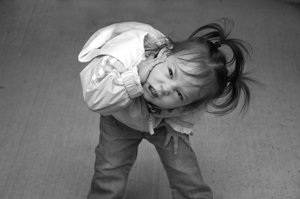 As parents, we’ve all been there. And if you haven’t yet, your time is coming – the time when your young child has a meltdown…and even worse, when they have a meltdown when you are out in public. It’s easy to look at other parents of young children who are having a meltdown in a restaurant or at a park and pass judgment about the quality of their parenting. But, if we’re being honest, we all know that it can happen to all of us. Toddlers and young children are still in the process of learning to control their emotions and control their behavior, so it’s bound to happen at some point. It’s a learning experience.
As parents, we’ve all been there. And if you haven’t yet, your time is coming – the time when your young child has a meltdown…and even worse, when they have a meltdown when you are out in public. It’s easy to look at other parents of young children who are having a meltdown in a restaurant or at a park and pass judgment about the quality of their parenting. But, if we’re being honest, we all know that it can happen to all of us. Toddlers and young children are still in the process of learning to control their emotions and control their behavior, so it’s bound to happen at some point. It’s a learning experience.
So, since a meltdown occurring during an inopportune time is likely to happen at some point, it can be a good idea to have a plan for how to respond.
- Remain calm! – I know, easier said than done. Though, a parent remaining calm is very important during a child’s meltdown. You are setting an example of how to respond when a situation is difficult. Kids take their cues from us. If we escalate our emotions, they will continue to escalate as well. Keeping a calm demeanor will help your child to match your calmer emotional response. Even though this can be quite frustrating, don’t lose your own temper!
- Assess whether your child has what they need – Meltdowns are a young child’s way of communicating. Meltdowns in young children are not because they are naughty or manipulative. It’s often because a child has a need or desire that they are unable to communicate at that time. I’m not suggesting that we give in to any wish they have at the moment, but being certain that their physiological needs are met can help.
- Use simple language and offer a choice for coping strategies – Simply state that it is time to calm down. Then, offer an option for how they might calm. For instance, when waiting in that restaurant, you might say, “Do you want to sit on my lap or do you want to color while we wait?” By offering suggestions we are teaching our children strategies for managing themselves when the situation is challenging. However, it is important not to over talk it. We all know that we cannot verbally reason with a young child who is emotionally charged. Too many words can make it more overwhelming. Make some simple statements and then use behavioral follow through and model a strategy to cope.
- Be consistent – Don’t cave because you want to avoid embarrassment in public. It’s oh so tempting to just give them the M&Ms even when you were saying “no” because they haven’t had their dinner. That will stop the meltdown and stop all the unwanted attention it is bringing. However, giving in will teach your child that their meltdown was a good way to get what they were seeking. This will most certainly come back to trouble us in the future.
Prevention of meltdowns is key. The following may help to ward off those difficult parenting moments.
- Planning for your child’s needs and knowing his limits – Physiological needs like being hungry, being overtired, or having a wet diaper can all contribute to a young child’s difficulty managing their emotions and behavior. Other triggers might include being overstimulated or not having the attention they desire at that time. Knowing your child’s triggers can certainly help you plan. For instance, waiting in a loud, busy restaurant for a meal when your child hasn’t eaten and is overtired from their day may result in him having difficulty managing his behavior. I can’t say I blame him. These triggers can make it hard for us as adults to regulate our emotions, too.
- Positive attention and praise – Very simply, reinforcement for a behavior makes that behavior more likely to occur again in the future. Instead of only attending to negative behaviors, we as parents need to be sure we are paying more attention to all the things we want to see our children doing more of. We need to say how proud we are that they are riding in the grocery cart and how much we like that they are using an inside voice. We need to “catch” them being good!
- Distraction – This can be a great tool to use to de-escalate a situation that’s brewing. Keeping your little one busy with enjoyable activities or switching tasks as your frustration grows can help to keep those crises diverted.
After a meltdown has happened, it’s nice to use it as an opportunity for teaching.
- Teach emotion words – Label for your child what you believe they were feeling. For example, “You were sad because you could not have that candy,” or, “You were angry about that toy not working.” Remember, oftentimes a young child’s meltdowns are related to a breakdown in communication. Provide your child with a model for how they might communicate in different situations by using their words instead of their behaviors.
- Teach alternative responses – Once your child has calmed, you can use the situation to teach a new, and better response. Model for your child what you would have liked them to do instead of have a meltdown. Consider modeling how they can ask for help or how they could take deep breaths to calm down.
- Praise your child’s ability to calm himself – Even though a meltdown may have just changed your plans for the evening, praise your child for his ability to calm himself once it is all over. Positive attention for a behavior makes that behavior more likely to occur again in the future. Praise their ability to calm so you can
- Do not inadvertently give in or give attention to the child’s negative behavior – Giving in to your child during or after a meltdown will accidently teach them that a meltdown is an effective way to get a want/need met. While having meltdowns can be a part of learning emotional and behavioral control and it is not likely that a child was attempting to be manipulative when they had a meltdown, if they realize that it works to their advantage, you will likely see them increase.
Unfortunately, it’s likely your child will have a meltdown at some point. You are not alone! However, stay calm, ignore any onlookers, and remember that this is a typical part of development and that the way in which we respond can help our child develop increased emotional and behavioral control.





These in my opinion are the essential points….”Assess whether your child has what they need” & “Planning for your child’s needs and knowing his limits” . Thank you for this informative article.